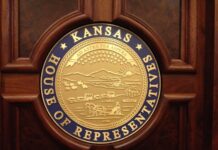Kansas may soon raise the bar for closing coal plants with new legislation that environmentalists say will favor one type of energy over another.
The bill, backed by the Kansas Chamber of Commerce, sets out a new set of requirements that state utility regulators must consider when deciding whether to close a coal plant.
The legislation sets a new legal standard of rebuttable presumption against the retirement of fossil fuel-fired electric generating units, meaning that it would have to be demonstrated that the plant should be closed.
Eric Stafford, vice president of government affairs for the Kansas chamber, said the bill is partly an attempt to protect state energy interests against federal efforts to incent renewable energy sources.
“You cannot just shut off fossil fuels today and expect to have a readily available sufficient energy supply tomorrow,” Stafford said in an interview.
“It’s working to ensure that outside interests aren’t influencing Kansas’ energy mix.”
The Kansas Corporation Commission would have to consider evidence in these areas in deciding whether the new legal standard for closing the plant had been met:
- The utility will replace the retired plant with new electric generating capacity that is dispatchable and maintains or improves the reliability and resilience of the grid.
- Closure of the plant will not harm the utility’s ratepayers or decrease the utility’s regional rate competitiveness.
- Retirement of the plan must be for economic purposes and for the benefit of ratepayers and not solely based on achieving environmental, social or governmental goals.
- Utility customers will have to save money when the plant is closed.
The bill, which was heard by the Senate utilities committee on Thursday, is expected to be amended as it moves through the process.
Zack Pistora, lobbyist for the Kansas Sierra Club, said he thought the bill was unnecessary.
He said the factors in the bill are already taken into consideration when deciding whether to close a coal plant.
Pistora said the Sierra Club was uncomfortable with any legislation that may extend the life of coal power any longer than necessary.
He said the bill creates more “checked boxes” and “red tape” that could “prolong expensive and harmful energy infrastructure and block smart energy investment.”
Kansas now has five coal plants, including three owned by Evergy. The plants owned by Evergy are in Pottawatomie County, Douglas County and Linn County.
There are two others, one owned by Sunflower Electric in Finney County and the Board of Public Utilities in Wyandotte County.
Rabbi Moti Rieber, executive director of Kansas Interfaith Action, was more direct in his assessment of the legislation.
“This bill puts the Legislature’s thumb on the scale in favor of a form of energy generation that is dirtier and more expensive,” Rieber said.
“It’s unnecessary and should be voted down,” he said.
Rieber’s remark drew an inquiry from Republican state Sen. Mike Thompson of Shawnee.
Thompson asked Rieber which wave length on the infrared spectrum is affected by the carbon dioxide molecule.
“I don’t have that information at hand, Senator,” Rieber said.
Thompson then asked Rieber how he could make a claim about climate change if he didn’t understand what carbon dioxide can and can’t do in the atmosphere.
“Senator, I know you have a long history of being against the science of climate change…,” Rieber said at which point he and the senator started talking over one another.
“Your assumptions are fallacious as always,” Rieber said to the senator as he testified virtually.
“Well, and your assumptions about the climate are incorrect, too” Thompson shot back. “I can debate you at any time.”
Evergy testified as neutral on the bill, but a top company executive says the company is working with supporters to find a compromise on the bill’s language.
Darrin Ives, regulatory vice president for Evergy, said the company’s goal is to reach an agreement that does not put “Kansas in jeopardy of being unable to retire generation if required or (if it’s) in the best interests of customers.”
“Evergy’s concern with the bill as written is that it is overly prescriptive and would tie our hands if there were significant additional costs or federal mandates that require closure of coal plants,” Ives said in written testimony.
“Our customers would bear the burden of that policy and it could be very costly in an era of changing Washington mandates,” he said.
Paul Snider, lobbyist for Kansas for Lower Electric Rates, said the bill ensures that the power capacity that customers have paid for over the years is not suddenly shut down primarily for environmental reasons.
“This bill is really pretty simple,” Snider said.
“It just states that if you’re going to replace a coal plant, you need to account for adding dispatchable power that would make up for that closure and that closing it is not going to cost more than keeping it open,” he said.
Snider said that no one appears to be in a hurry to close a coal plant, but the bill provides assurances that the state will have reliable power for the near future.















